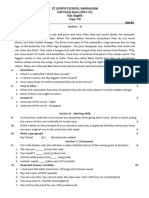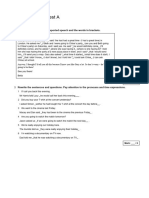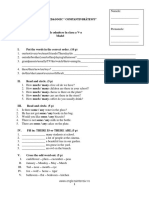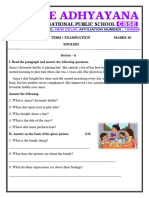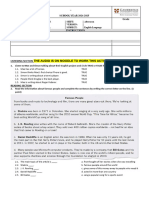Mock Test 2 March2010
Mock Test 2 March2010
Uploaded by
КристинаЂ.Copyright:
Available Formats
Mock Test 2 March2010
Mock Test 2 March2010
Uploaded by
КристинаЂ.Original Description:
Original Title
Copyright
Available Formats
Share this document
Did you find this document useful?
Is this content inappropriate?
Copyright:
Available Formats
Mock Test 2 March2010
Mock Test 2 March2010
Uploaded by
КристинаЂ.Copyright:
Available Formats
MOCK TEST 2 1
st
Year March 2010
I Reading comprehension test : total: 10 p. (min. 5p.)
John Lewis Clarke
In Glacier National Park, which is in the Rocky Mountains of Montana, there once roamed
a little deaf Indian boy. He loved to wander in the forest, and made friends with the animals who
lived there. Since he loved animals, he would observe them intently and learn their habits. This
little Indian boy's name was John Lewis Clarke.
John Lewis Clarke was not born deaf. He became ill at a young age with scarlet fever.
Though he survived, he could no longer hear the sounds that the forest animals made. He could
not hear his Indian friends when they called to him. Scarlet fever had caused him to lose his
hearing. His Indian friends gave him the name Cutapuis (Cu-ta-pu-ee) which means, "man who
talks not."
Because John could not talk, he could not tell his parents about his many animal friends in
the forest and the exciting things that he saw, but he found another way to express himself. He
made figures of them out of clay from the river banks. Later, when he was older, he learned to
carve things out of wood. He loved to carve animals. With an axe and a pocket knife, he carved a
life-sized image of a bear from a cedar trunk. The bear looked so real, the only thing missing was
its growl.
Since John needed special education, he was sent to a school for the deaf at Boulder,
Montana. When he was older, he enrolled at St. Francis Academy in Milwaukee, Wisconsin,
where he studied wood carving. While he was still in his teens, John returned to Montana and
opened a studio. He began to carve all the animals he had known very well in his childhood, and
offer them for sale. He made models of animals out of wood, clay, and stone. He painted pictures
using water colors and oils, and did excellent pen and ink drawings. He began to make a name for
himself as an artist.
John spent most of his 89 years at his home studio in Glacier Park. Every year when the
park season was over, he continued his work in Great Falls, Montana, his second home. Many
important people bought John's work. John D. Rockefeller, Jr., the famous multimillionaire, was
one of them. John's work was on exhibit in many places in this country. John died on November
20, 1970. In his life-time, he literally carved his way to fame.
I Mark if the following statements about the text are true (T) or false (F): (5 pts.)
1. J ohn Lewis Clarke was an Indian boy who got lost in the forest
and was saved by animals. _______
2. J ohn had been deaf from the first day of his life. _______
3. J ohn had an original way of expressing himself. _______
4. Although he had to receive special education, he became an artist. _______
5. J ohn's work was not appreciated out of his hometown. _______
II Choose the right answer to complete the sentences based on the text: (5 pts.)
1. J ohn Lewis Clark was an Indian boy who _______________:
a) was found in a forest b) found friends in animals
c) worked in a national park d) was afraid of animals
2. J ohn could not hear because he ________________:
a) got ill as a little boy b) was born with scarlet fever
c) another Indian hurt him d) was never taught to speak
3. J ohn made his first figures of clay ______________:
a) to hide from a big bear b) to make his friends jealous
c) because he had no wood d) to communicate a message to his parents
4. He opened his own studio _______________:
a) in Milwaukee b) in his childhood
c) as a teenager d) when he became a famous artist
5. J ohn spent his time in Montana ________________:
a) when his career ended b) once a year
c) thanks to Rockefeller d) for the greater part of his life
LANGUAGE IN USE TEST Student: .
I Complete the sentences by putting the verbs in the right form: (5 pts / min. 3)
1. We / not go / on picnic / if / it rain / tomorrow.
2. If / I / have / more money / I / buy a house / in Spain.
3. She / not know / where / go / for her holiday.
4. Please tell mum / call me / when she / get home.
5. Our parents / not let us / stay out late / when we were kids.
II Put the verb in the right form: (5 pts / min. 3)
1. I will make her ____________________ (go) there with me.
2. You shouldn't ____________________ (come) here so often.
3. I'm _______________________ (get) fed up with this noise, really!
4. Who was supposed __________________ (send) these letters?
5. That country is really worth ____________________ (visit).
III Circle the appropriate form in each sentence: ( 5 )
1. We couldnt keep in touch / lose touch with them because they moved to Canada.
2. Dont be so impatient / unpatient! Wait a little.
3. Despite / in spite being very tired, she decided to go out.
4. I cant remember his name, although / however youve told it to me a dozen times.
5. I cant be bothered / dont feel up to go out now, I am too tired.
6. We offer various kinds of entertainment / entertaining for your children in this park.
7. Hardly any / Too many stuff is recycled in this country.
8. The woman whose / which fasting programme we were following is Rachel Carr-Hill.
9. Were going to carry out / call off a new survey next month.
10. If you have a full-time / temporary job, you work 8 hours every day in the working week,
throughout the year.
IV Complete the sentences: ( 5 )
1. A lot of cars .. .
2. I wish ..
3. She wouldn't have said that .
4. I want to know where .
5. I don't know if .
POENI i OCENE:
SA KOLOKVIJ UMIMA:
I II
TESTS:
List. Lang. in
Use*
Class
partic.
Read. Lang.
in Use*
Class
partic.
Written
Oral:
Total
max. 10 20 5 10 20 5 70 30 100
min. 5 11 2 5 11 2 36 15 51
* * U II delu testa Language in Use, prve 2 vezbe su eliminatorne.
Ako na njima student ne sakupi po 3 poena ne prolazi dalje.
KONANA OCENA
0 50 = 5
51 60 = 6 61 - 70 = 7 71 80 = 8 81 90 = 9 91 100 = 10
You might also like
- Evaluación Integradora Ingles SMA 2023 - 1ST TERM - ADAPTADADocument3 pagesEvaluación Integradora Ingles SMA 2023 - 1ST TERM - ADAPTADAJavier AcevedoNo ratings yet
- Test - Upper - F2F - Unit1-3 - FINALDocument4 pagesTest - Upper - F2F - Unit1-3 - FINALLucian PodaruNo ratings yet
- اختبار انجليزي فتري ثالث متوسط 1445 موقع منهجيDocument4 pagesاختبار انجليزي فتري ثالث متوسط 1445 موقع منهجيyahia222000No ratings yet
- Unit 5 Basic TestDocument2 pagesUnit 5 Basic Testmitio pishtovaNo ratings yet
- AEF3e L2 Progresstest 7 12bDocument9 pagesAEF3e L2 Progresstest 7 12bzaramfm98No ratings yet
- WA 02 Unit Test 07Document8 pagesWA 02 Unit Test 07edzellandresmartinezNo ratings yet
- 1.where Does Her Brother Work?Document13 pages1.where Does Her Brother Work?My Mieu Dang ThiNo ratings yet
- 1st Periodical in Grade 3 ..Document12 pages1st Periodical in Grade 3 ..Xoxi FernandezNo ratings yet
- 380188Document5 pages3801880666162414iNo ratings yet
- 4° ITerm Eng FinalExamDocument7 pages4° ITerm Eng FinalExamMaryi Valbuena PulidoNo ratings yet
- 9th Interm C Second Term Reflective ExamDocument4 pages9th Interm C Second Term Reflective ExamMario PeñaNo ratings yet
- 7 EnglishDocument2 pages7 Englishranisrivastava1978No ratings yet
- Units 1 - 5 Review: Section 1: GrammarDocument8 pagesUnits 1 - 5 Review: Section 1: GrammarPha SinarakNo ratings yet
- Solutions Unit 1 Test Inter (DL)Document4 pagesSolutions Unit 1 Test Inter (DL)Deimantė LunytėNo ratings yet
- Test 14Document5 pagesTest 14Hmu Thitsar Kyaw0% (1)
- Test 2nd Adolescents Unit 5Document2 pagesTest 2nd Adolescents Unit 5tutycandeNo ratings yet
- Sprawdzian AngielskiDocument3 pagesSprawdzian AngielskiMICHNIKNo ratings yet
- Kiem Tra Lop 8 So 2Document4 pagesKiem Tra Lop 8 So 2Nga DoNo ratings yet
- De Thi Tieng Anh HK 1 Lop 9Document16 pagesDe Thi Tieng Anh HK 1 Lop 9nhan199No ratings yet
- Đề kiểm tra Anh 8 học kì 1(1)Document6 pagesĐề kiểm tra Anh 8 học kì 1(1)Vũ HưngNo ratings yet
- Đề 1-2-3Document6 pagesĐề 1-2-3Quang HọcNo ratings yet
- 7 All - Merged 1Document34 pages7 All - Merged 1radhavenkateshwaranNo ratings yet
- De Thi Hoc Ki 1 Tieng Anh 5 de So 4 1668224270 1 2Document2 pagesDe Thi Hoc Ki 1 Tieng Anh 5 de So 4 1668224270 1 2thienan3512No ratings yet
- Trac Nghiem Tieng Anh 9 Unit 6Document6 pagesTrac Nghiem Tieng Anh 9 Unit 6grasovuNo ratings yet
- Assessment 1 Year 3 EnglishDocument10 pagesAssessment 1 Year 3 EnglishAdie AbdullahNo ratings yet
- Past Perfect TenseDocument11 pagesPast Perfect Tensepeopler543No ratings yet
- Unit 5 Basic TestDocument2 pagesUnit 5 Basic Teststudiook.129No ratings yet
- i5-Team-2-Test-2Document4 pagesi5-Team-2-Test-2Dijana PetrovskaNo ratings yet
- Đề Nâng Cao Anh 8 - Bài 3 (22-23) - KeyDocument4 pagesĐề Nâng Cao Anh 8 - Bài 3 (22-23) - Keynguyenthuytrang1629No ratings yet
- Extra Practice - VocabularyDocument5 pagesExtra Practice - VocabularyAlejandraNo ratings yet
- Засоби масової інформаціїDocument6 pagesЗасоби масової інформаціїОлег OlEGNo ratings yet
- Bài Thi Môn Anh 8Document4 pagesBài Thi Môn Anh 8Tuệ MinhNo ratings yet
- WORKSHEET 5 Mrs. Champa DuttaDocument6 pagesWORKSHEET 5 Mrs. Champa Duttakumarbinodkr0077No ratings yet
- HYE Mock Paper IVDocument4 pagesHYE Mock Paper IVS ChinthareddyNo ratings yet
- Final Exam Grammar IVDocument10 pagesFinal Exam Grammar IVaida nanoNo ratings yet
- 2016 SUBIECT EXAMEN SCRIS 8 KaqplgnrDocument6 pages2016 SUBIECT EXAMEN SCRIS 8 KaqplgnrCecilia CeliaNo ratings yet
- Intensiv CLS 5Document19 pagesIntensiv CLS 5Alexandra LupuNo ratings yet
- ĐỀ KIỂM TRA CUỐI KÌDocument4 pagesĐỀ KIỂM TRA CUỐI KÌHồ T. Phương ThảoNo ratings yet
- Review Grade 4 Listen and Draw Lines: Fred Jim VickyDocument6 pagesReview Grade 4 Listen and Draw Lines: Fred Jim VickyNguyen DuongNo ratings yet
- Semi-Detailed CATCH UP PLAN ENGLISH 7Document4 pagesSemi-Detailed CATCH UP PLAN ENGLISH 7Vilma Buway AlligNo ratings yet
- Test Unit1Document5 pagesTest Unit1Султан КенжебаевNo ratings yet
- Primaria Ingles Knowledge6iconosDocument8 pagesPrimaria Ingles Knowledge6iconosNatalia BáezNo ratings yet
- Đáp án đề cuối kì IDocument4 pagesĐáp án đề cuối kì INguyễn CúcNo ratings yet
- 6765993072Document4 pages6765993072Kavi VinuNo ratings yet
- Advanced Test - Grade 4Document7 pagesAdvanced Test - Grade 4vyhan2309No ratings yet
- Test 2 8 formDocument3 pagesTest 2 8 formSofia YatsynaNo ratings yet
- Class VIII SLW October 2024Document4 pagesClass VIII SLW October 2024Manish AgrawalNo ratings yet
- Education Gate International School-R: ReadingDocument21 pagesEducation Gate International School-R: Readingmamdouhsafa744No ratings yet
- Test 2 Grade 8Document2 pagesTest 2 Grade 8Dorotej StavreskiNo ratings yet
- Baburs Ali.: Exame Final de Inglês I. Question One: Comprehension (5 Marks)Document12 pagesBaburs Ali.: Exame Final de Inglês I. Question One: Comprehension (5 Marks)ErickNo ratings yet
- Term Paper 9th Grade IIDocument3 pagesTerm Paper 9th Grade IIAlina Georgia MarinNo ratings yet
- 10TH AFTERNOON APORTE 5 (1)Document3 pages10TH AFTERNOON APORTE 5 (1)María Belén RonquilloNo ratings yet
- Test March f3 2019Document6 pagesTest March f3 2019farahNo ratings yet
- Venture b2 Unit 3 RecuperoDocument5 pagesVenture b2 Unit 3 RecuperoMiki 00No ratings yet
- Context Clues Choose The Best Meaning The Word That Is Underlined. Encircle The Letter of Your ChoiceDocument5 pagesContext Clues Choose The Best Meaning The Word That Is Underlined. Encircle The Letter of Your ChoiceTutees MCNo ratings yet
- Class8 Midtesti 2Document6 pagesClass8 Midtesti 2dangkhoa100197No ratings yet
- English TypesDocument18 pagesEnglish TypesadheaserinasNo ratings yet
- Test 1 ADocument4 pagesTest 1 ANhã NguyễnNo ratings yet
- 4th Quarter Test in Grade 3Document7 pages4th Quarter Test in Grade 3Xoxi FernandezNo ratings yet











